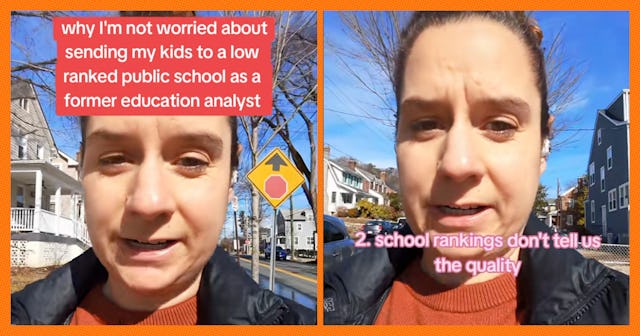A Mom Explains Exactly Why She Picked A “Low-Ranking” Elementary School For Her Kids
“We need to make the decisions that are best for our own kids,” says the former education analyst.

For many parents, deciding where to send your child to school can be one of the most stressful decisions of their early life. Many families might even move in order to be in a “good school district” with high-ranked, award-winning schools. But TikTok user Lindsay Templeton (@lhtempleton), former education analyst who worked on school rankings, wants parents to rethink how they might think about quality education. Specifically about those rankings.
“I don't believe the rankings tell us much about the school, or at least what I want to know,” she writes in her caption. “We need to make the decisions that are best for our own kids.”
Templeton’s district doesn’t rank low by many measures, but it offers the option for families to enter a lottery for high-ranked schools and charter schools. But she’s opted to send her rising kindergartner to the in-bounds, low-ranked public school. It’s not a decision she made blithely, but rather, one she made due to a number of important factors.
Elementary school is not tied to future success
At least not to the extent that other factors will effect that outcome. Factors that do heavily influence future success at the elementary school age, Templeton says, include “home environment, family attitude towards education, parent socioeconomic status, community support, and a handful of socio-emotional skills.”
In other words, you probably don’t have to worry about your child getting into Yale because they didn’t go to the “right” kindergarten.
Rankings may not reflect quality
Templeton points out that standardized tests scores are heavily weighted when it comes to school rankings. Time and time again, researchers have found standardized tests are imperfect measures of ability at best and outright biased at worst.
“Not only is the US the only country in the developed world that uses standardized tests in the way that we do,” says Templeton, “we know from decades of data collection and research that these standardized test scores are not telling us about the quality of education our kids are receiving; they’re telling us about the number of affluent white native English speakers.”
And above and beyond broad issues one might take with standardized testing, the devil is in the details at this particular juncture.
“When I’m reading the fine print on some of these rankings, they’re using data from the 2020/21 school year and the 2020/2022 school year.”
If you were a parent during the peak Covid years — when kids were remote learning and many tests/assessments were being done at home under less than ideal testing circumstances — you know why those metrics should be eyed skeptically.
Student retention should not be a measure of school quality
Templeton also highlights the fact that student retention is also sometimes factored into how a school is ranked, and she doesn’t think that reflects how good or bad the education will be.
All that tells us is how transient a community is which could be based on so many factors,” she explains.
Class size doesn’t necessarily mean anything
Of course everyone wants to make sure that their kids are getting attention and it makes sense that one might prefer a school with a 1:16 ratio over a 1:40 ratio. But, Templeton argues this tells her more about how “the district and the state are allocating money” more than it will tell her the quality of the education her child gets in the classroom.
So what questions should we ask when deciding?
The factors Templeton chose to focus on are things that likely wouldn’t be included in an official school ranking, such as...
- What is the support staff like?
- How long has the principal been there?
- How long has the rest of the administration been at the school?
- What’s the average teacher tenure?
- What kind of opportunities are there for parents to be involved?
At the end of the day, it’s not about how “good” or “bad” a school is: it’s about whether it’s a good fit for your child, family, and values.
“Some of the loudest people about the quality of the schools do not have kids in those schools or even in the system,” Templeton concludes. “So dig a little deeper, ask some more questions when people are being loud about how bad that school is.”